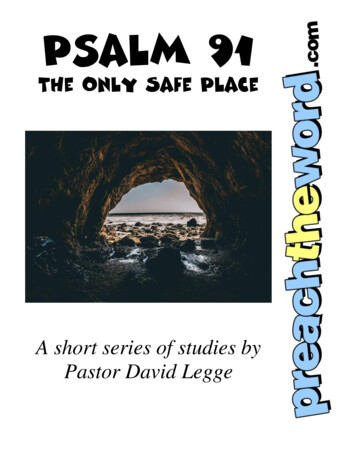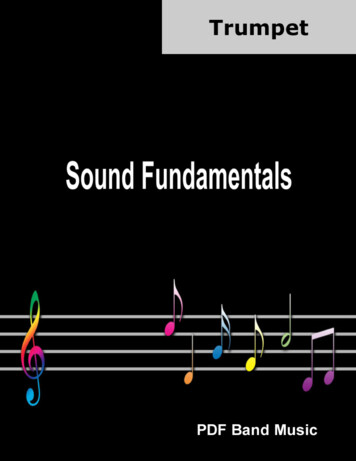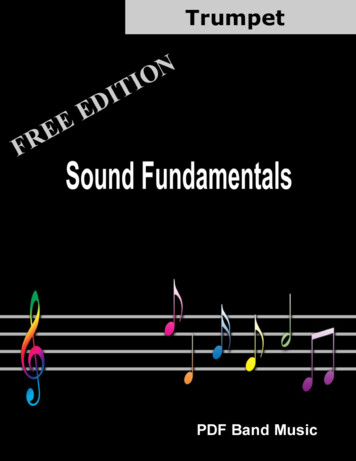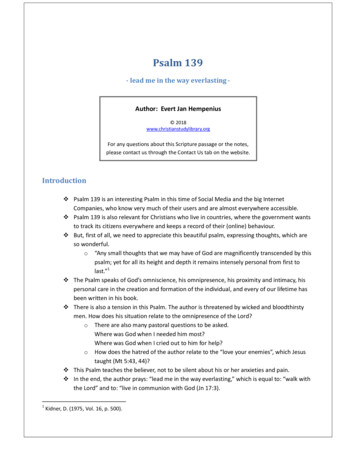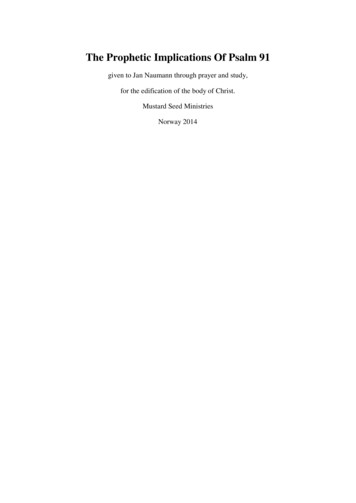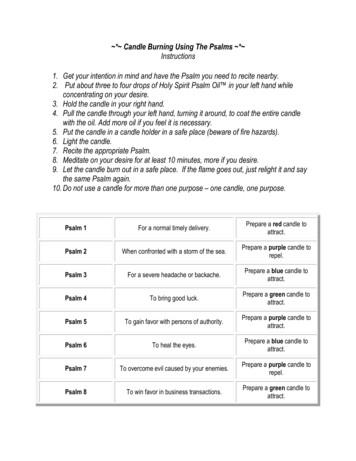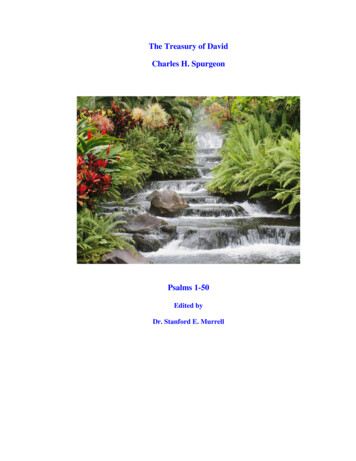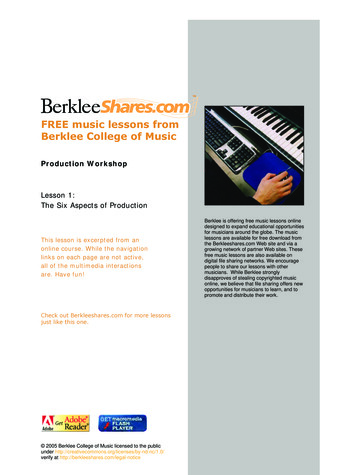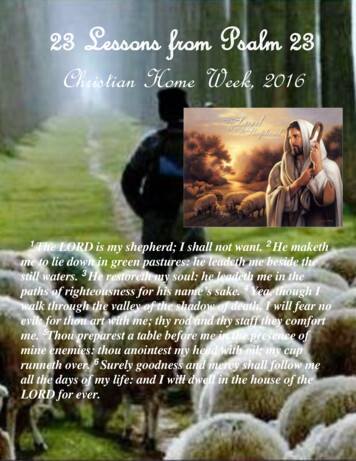
Transcription
23 Lessons from Psalm 23Christian Home Week, 20161The LORD is my shepherd; I shall not want. 2 He makethme to lie down in green pastures: he leadeth me beside thestill waters. 3 He restoreth my soul: he leadeth me in thepaths of righteousness for his name’s sake. 4 Yea, though Iwalk through the valley of the shadow of death, I will fear noevil: for thou art with me; thy rod and thy staff they comfortme. 5Thou preparest a table before me in the presence ofmine enemies: thou anointest my head with oil; my cuprunneth over. 6 Surely goodness and mercy shall follow meall the days of my life: and I will dwell in the house of theLORD for ever.
INTRODUCTIONThe words of the 23rd psalm continue to comfort countless of persons. For Christian Home Week,consider going through the psalm as follows. There are a total of 23 devotionals in addition tointroductions so feel free to pick and choose what you would like to go through.Introduction1. The Setting: Psalm 22, 24.2. The Sheep: Psalm 23Verse One3. The Shepherd: The LORD is my shepherd (v. 1a.)4. The Satisfaction: I shall not want (v. 1b)Verse Two5. The Settling: He maketh me to lie down (v. 2a)6. The Sustenance of the : in green pastures (v. 2b)7. The Submission of the sheep: He leadeth me (v. 2c)8. The Serenity of Shepherd’s lead: beside the still waters (v. 2d)Verse Three9. The Soul’s Restoration: He restoreth my soul (v. 3a)10. The Salvation of Righteousness: He leadeth me in the paths of righteousness11. The Sake of His Name: for His name’s sake (v. 3b)Verse Four12. The Steps through the Valley: Yea, though I walk through the valley (v. 4a)13. The Shadow of Death: of the shadow of death (v. 4b)14. The Separation from Fear: I will fear no evil (v. 4c)15. The Staying of the Savior: for Thou art with me (v. 4d)16. The Soothing Protection Thy rod and Thy staff (v. 4e)17. The Solace in Correction: they comfort me (v. 4f)Verse Five18. The Supply of Nourishment: Thou preparest a table before me (v. 5a)19. The Surrounding of Adversity: in the Presence of mine enemies (v. 5b)20. The Sanctification of the Spirit: Thou anointest my head with oil (v. 5c)21. The Superabundance of the Spirit: my cup runneth over (v. 5d)Verse Six22. The Surety of Earthly Blessings: Surely goodness and mercy shall follow me all the days of my life(v. 6a)23. The Sanctuary of Eternal Blessings: and I will dwell in the house of the LORD for ever. (v. 6b)
Introduction Part 1. Set between Suffering and SovereigntyIntroduction to Psalm 23Between the Suffering Christ of Psalm 22 and the Sovereign Christ of Psalm 24 is the Shepherd Christof Psalm 23. Of this psalm, Martin Luther said, “Of all the figures that are applied to God in the OldTestament, that of a shepherd is the most beautiful. It brings to the godly, when they read it or hear it, as itwere, a confidence, a consolation or security, like the word father.”The Shepherd’s psalm is nestled between Christ’s suffering and sovereignty, providing that confidenceand consolation Luther wrote about. When you look at this psalm, you find the feelings of suffering, butalso a song. That is a picture of the caring shepherd. The good shepherd knows about the wounds of life,wounds you may think, “These will never heal up.”But the fact that Christ has suffered as seen in psalm 22 is proof that God can identify with us and ourwounds. Psalm 22 begins with “My God, My God, why have You forsaken Me?” quoted by Christ on thecross, and showing us that He identifies with our utter despair.The fact that Christ is sovereign as seen in psalm 24 is proof that God can rescue us from ourproblems. The psalm which follows the Shepherd’s psalm promises a triumphant return of the King ofGlory and the Lord of hosts who will come valiantly through the mighty gates and everlasting doors. “TheKing of glory shall come in. ‘Who is this King of glory?’ The Lord strong and mighty. The Lord mighty inbattle” (Ps. 24:7b-8).And the fact that Christ is our Shepherd as we will see in this study is proof that God’s loving care willwatch over us dumb, helpless, needy sheep.“Lord Jesus, help us this month to see You as our Shepherd who watches over us, relatingwith our human weaknesses and reigning with your godly strength. Amen.”
Introduction Part 2. The Sheep: You make the Shepherd HappyC.H. Spurgeon said of the 23rd Psalm, “It isDavid’s Heavenly Pastoral; a surpassing ode,which none of the daughters of music canexcel This is the pearl of Psalms whose softand pure radiance delights every eye.”Perhaps it is so loved because it is told from thevantage point of a sheep. The identification of ashepherd towards his sheep is something Christused repeatedly.In English, sheep can be singular or plural, butthe 23rd Psalm is written in the first person. We mustsee the writer not as “us” or “we”, but “me” and “I”.He is “my” Shepherd because I belong to Him.Jesus called me “His.” What a wonderful thing.Luke 15:6 says “And when he came home, hecalled together his friends and neighbors, sayingunto them, ‘Rejoice with me; for I have found mysheep which was lost.’” Do you know that when youbecame one of His sheep, He rejoiced and got thewhole host of heaven to rejoice.Do you know you can’t cover up who you are andif you could, God wouldn’t love you more? You can’tcover up who you are and Jesus doesn’t love youany less. Read John 10:14-16 “I am the goodshepherd, and know my sheep, and am known ofmine 15 As the Father knoweth me, even so know I the Father: and I lay down my life for the sheep.” Inthe Greek, there is no period between verse 14 and 15. Just as Jesus knows His Father and just as theFather knows the Son, Jesus knows all about you, even the numbers of your head and loves youanyway.Because I am His sheep, I believe and follow Him. See John 10:26 “But you believe not, because youare not of my sheep, as I said unto you. 27 My sheep hear my voice, and I know them, and they followme.”This second lesson on the sheep is that I am important to the Shepherd.“Thank you Lord Jesus in delighting in me.Help me remember today that I am important to youand I bring you joy. Amen.”
3. The Shepherd: When My Shepherd and God's Shepherd metVerse 1a: Psalm 23Albert Barnes wrote, “The psalm has always beenregarded as one of exquisite beauty. The leading thought is hisfull belief that God would provide for him, and that he wouldnever be left to want.”The word “LORD” is the name Jehovah, Yah-weh, aname Jesus uses in the Seven “I AM” statements in gospel ofJohn[1] and the book of the Revelation.[2] Jesus literally means“Jehovah is Salvation.” When Moses needed to define who Godwas, God revealed Himself as Jehovah (Exod. 3:14), “the selfexistent One” (Scofield).Secondly notice that the Shepherd is mine. Spurgeon saidthat the sweetest word in the sweetest psalm is the word “my.” Heis my Substitute, receiving the affliction we deserve. The word“shepherd” in a Hebrew dictionary is next to the word“friend.” When you read this psalm, do not read as a poem or as amere work of literature. Read it as one who knows the Shepherdintimately.Third, Jesus is God’s Shepherd. The phrase “my shepherd”is only used again in Zech. 13:7 “Awake, O sword, against myshepherd saith the LORD of hosts: smite the shepherd.” God’sShepherd is not a hireling who runs from danger. He justified mein His death (John 10:10), sanctifies me in His life (“that Great Shepherd of the sheep (will make) youperfect in every good work to do his will,” Heb. 13:20-21), and “And when the chief Shepherd shallappear,” (1 Pet. 5:4) He will glorify me.My shepherd and God’s shepherd met at Calvary, making Him “who knew no sin to become sin forus, that we might be made the righteousness of God” (2 Cor. 5:21).“My Lord and My Shepherd, I glorify you for loving me enough to die for me, living for me tosanctify me, and for never leaving me. Thank you for becoming God's Shepherd for me.”[1] Seven Intransitive “I AM” Statements in John: 1“I AM that speaks to you” (John 4:26); 2“IAM, do not fear” (John 6:20); 3“If you do not believe that I AM” (John 8:24); 4“ you will know that IAM” (John 8:28); 5“Before Abraham was, I AM” (John 8:58); 6“You may believe that I AM” (John13:19); 7 “Jesus said to them, ‘I AM’ ” (John 18:5).Seven Transitive “I AM” Statements in John: 1“I AM the Bread of Life” (John 6:35, 48, 51); 2“IAM the Light of the World” (John 8:12, 9:5); 3 “I AM the Door” (John 10:9); 4 “I AM the GoodShepherd” (John 10:11, 14); 5 “I AM the Resurrection and the Life” (John 11:25); 6 “I AM the Way, theTruth and the Life” (John 14:6); 7“I AM the True Vine” (John 15:1, 5).[2] Seven “I AM” Statements in Revelation: 1“I AM Alpha and Omega” (Revelation 1:8, 11, 21:6,22:13); 2“I AM the beginning and the ending” (Revelation 1:8, 21:6, 22:13); 3“I AM the first and thelast” (Revelation 1:11, 17, 22:13); 4“I AM He that liveth ” (Revelation 1:18); 5“I AM He whichsearcheth the reins and hearts” (Revelation 2:23); 6“I AM the root and offspring of David” (Revelation22:16); 7“I AM the bright and morning star” (Revelation 22:16).
4. The Satisfaction: With Him, what do you lack? Without Him, what do you have?Psalm 23:1bBaptist pastor F.B. Meyer said of Psalm 23 “Come hither, weary ones, restless ones, heavy-ladenones; sit down in this cool and calm resort, while the music of its rhythm charms away the thoughtsthat break your peace. How safe and blessed are you to whom the Lord is Shepherd! Put down thisvolume and repeat again, in holy reverie, the well-known words to the end, and see if they do notbuild themselves into a refuge on which the storms may break in vain.”A little girl was quoting from memory the 23rd Psalm, but did not quiteget it right: “The Lord is my shepherd, He is all I want.” She may not havegotten it verbatim but she did capture the heart of David, “He is all I want.”When I come to the Lord as my Shepherd, I am satisfied in Him. I maylack material things, I certainly will not be perfect, but I can findcontentment in Christ, not because of material fullness but in spite of mylacking. Jesus said it also on the Sermon on the Mount, “Blessed arethose who hunger and thirst for righteousness, for they shall be satisfied”(Matt. 5:6, ESV). I shall not be in lack or short of anything I need when Irely on God.R.B. Thieme Jr. said that because the word “want” is in the Greekversion of the Old Testament in the imperfect tense, it could be translated“I cannot want or lack for anything.” That can be true because if you arenot wanting something you don’t have, you do not have any feelings ofunfulfillment.Hmm. That’s too many double negatives. Let me say it this way. If the only thing you want is whatyou have, you only have feelings of fulfillment.Hmm again. Maybe I should say what Jesus said, “For what is a man profited, if he shall gain thewhole world, and lose his own soul?” (Matthew 16:26). When John D. Rockefeller, one of thewealthiest men in the world, died, someone asked “how much did he leave?” His accountantanswered, “all of it.”The rich young ruler kept all the rules, but missed the Shepherd. Jesus said, “One thing you lack:go your way, sell all you have and give to the poor, and you shall have treasure in heaven.”You know the rest of the story. He went away sadly because he loved the world which left himempty and left the Shepherd who loved him fully.If Jesus is your Shepherd, what do you lack? If He is not your Shepherd, what do you have?Father, grant me contentment today. Let me treasure you in my life and forget the things that Idon't have. Help me to find you as all I want and find fulfillment in that alone. Amen
5. The Settling of His Refreshing: "He makes me to lie down"Psalm 23:2aProfessor and Author Dr. Kyle M. Yatesexpressed it eloquently: “Because He loves me asthe good Shepherd, I shall never want. Does Heleave out anything in the world that a soul canpossibly need? Every material and everyspiritual need is provided for helpless, needycreatures who look to the Shepherd for suchsatisfactions. Only in Him can they be found.”Parallel passages. The Shepherd satisfies meand He also settles me down. The imagery of lyingdown is found in other verses. Job 11:19 says “Alsoyou shall lie down, and none shall make youafraid ” Ps. 4:8 proclaims, “I will both lay me downin peace, and sleep: for only You, LORD, make me dwell in safety.” In Isa. 17:2: “ they shall be forflocks, which shall lie down, and none shall make them afraid.” Eze. 34:14-15 expounds the imageryeven further, “I will feed them in a good pasture and on the high mountains of Israel shall their fold be:there they shall lie in a good fold, and in a lush pasture they shall feed on the mountains of Israel. Iwill feed my flock, and I will cause them to lie down, says the Lord GOD.” Also in Zeph. 3:13 speaksof God’s people, “ for they shall feed and lie down, and none shall make them afraid.”Peace. Sheep are naturally and easily frightened; it is difficult for a shepherd to make his flock tolie down in complete repose. “Lie down” literally means the folding of the legs in a reclining position.Imagine the care a shepherd has to have to make his skittish and scared sheep to be completelycomfortable in lying down. A good shepherd will provide peace. Jesus makes me lie down with Hispeace that passes all understanding. Unlike the world’s peace (John 14:27), His peace is internal andeternal. Hebrews 13:20-21 says, “Now the God of peace, who from the dead brought our Lord Jesus,that great shepherd of the sheep may He make you complete.”Protection. There must be safety from harm, predators, sounds and even each other. Sadly welike sheep can also need protection from each other. The Shepherd settles His sheep by providingprotection. Once secure, the legs of the sheep fold down and lay down with their “bellies nestled deepin the long shoots of grass. A still pond on one side, the watching shepherd on the other Who is incharge? The shepherd.” (Max Lucado, Traveling Light, pg. 40).Passion of the Shepherd. What motivates Christ to make me lie down? Matthew 9:36 says, “Butwhen he saw the multitudes, he was moved with compassion on them, because they fainted, andwere scattered abroad, as sheep having no shepherd.” His love makes me lie down. Not by force orcoercion but by the immanence of His great love and compassion.Fold your legs today and recline in His peace.Lie down in the shadow of the Shepherd’s protection.Rest in lush pastureland of His passionate love for you.“Dear Shepherd of my soul, I am so stubborn and skittish and scared sometimes.Thank you for making me to lie down in You. Amen.”
6. The Sustenance of His Residence: "in green pastures"Psalm 23:2b“Do more beloved words exist?” asked MaxLucado. “Framed and hung in hospital halls,scratched on prison walls, quoted by theyoung, and whispered by the dying. In theselines sailors have found a harbor, thefrightened have found a father, and strugglershave found a friend. Can you find ears onwhich these words have never fallen?”A shepherd has a destination in mind as hetakes out his flock. So does the Good Shepherdfor me. The word “pastures” can also betranslated as places of habitation, residences,even houses. The destined habitation for thesheep is a place which would be full ofnourishment. So also is God's destination forme.One way a shepherd will “make” his sheep lie down is to fill them full of nourishment. Often, I amanxious and do not lie down and rest in my Lord because I fail to feast on the spiritual nourishmentmy Shepherd has for me.In John 6:35, Jesus said, “I am the Bread of Life. He who comes to Me shall never hunger, and hewho believes in Me shall never thirst.” I am to be nourished by residing in the Word of God. Matthew4:4 proclaims that “man shall not live by bread alone, but by every word of God.”The sheep feast in green, lush pastures, filled with freshly sprouted grass. For the sheep to fullydigest the grass, they must consume and then rest to allow for several stages of digestion. Theygraze during the day and then chew their cud for digestion throughout the night. Likewise, it is notenough for my spiritual nourishment to simply feast on the Word in the day. I must put the words intopractice during the dark and long nights of my spiritual journey. I must “hunger and thirst forrighteousness” in order for me to be filled.Grazing on food more easily digested than grass can cause the sheep to become bloated andeven die. I need the milk of the Word but also the meat of spiritual food. Without internalizing theword, applying it and practicing the righteousness of God during hard and dark times, God’s truths willnever be fully realized.What is on your spiritual menu? Is Christ residing in you? Are you reading His Word? Is Hisrighteousness what you hunger and thirst for?My Shepherd, I have failed. I have longed for spiritual food that is not in your preparedpastures. I want to eat food by day but not properly apply it in the dark nights. Forgive me.Feed me in your pastureland. Amen.
7. The Submission to His Rule: "He leadeth me"Psalm 23:2cMartin Luther wrote, “Of all the figures that are applied to God in the Old Testament that of ashepherd is the most beautiful. (T)he sweet word shepherd brings to the godly a confidence, aconsolation or security, like the word father. A sheep can only live through the help, protection, andcare of its shepherd. As soon as it loses him, it is exposed to dangers of every kind, and must perish,for it cannot help itself. The reason is, it is a poor, weak, silly creature. But weak creature though it be,it has the habit of keeping diligently near its shepherd, of depending upon his help and protection; itfollows wherever he leads, and, if it can only be near him, it cares for nothing, is afraid of no one, butfeels secure and happy, for it wants for nothing.”The Leading Shepherd. My Shepherd knows how to lead. He gets in front of me, never leading frombehind. John 10:4 “And when he put forth his own sheep, he goes before them, and the sheep follow him:for they know his voice.” In Israel, it is the butcher, not the shepherd, who walks behind the sheep. Heleads because He has gone before me.i) In Evil Temptations - Heb. 2:18 says, “For in that He Himself has suffered being tempted, he isable to come to the aid of those who are tempted.” Heb. 4:15 “For we have not a high priest who cannotbe touched with the feeling of our infirmities; but was in all points He was tempted as we are, yet withoutsin.”ii) In Earthly Humiliation - Phil. 2 “5Let this mind be in you, which was also in Christ Jesus: 6Who,being in the form of God, did not think it robbery to be equal with God: 7 But made Himself of noreputation, and took upon himself the form of a servant, and was made in the likeness of men: 8 And beingfound in fashion as a man, He humbled Himself, and became obedient unto death, even the death of thecross.”iii) In Eternal Restoration - Revelation 7:17 “For the Lamb who is in the midst of the throne shall feedthem, and shall lead them unto living fountains of waters: and God shall wipe away all tears from theireyes.” He is the Good Shepherd because He is also the Lamb who identifies with us and our needs.The Led Sheep. Twice in this short psalm, I am encouraged to relish the leadership of my Shepherd,first here in verse two in His leading me in serene refreshment and then again in the following verse forHis leading me in sanctifying righteousness. Because my Shepherd has gone before me, I can trust Himbecause He knows where He came from and where He is going. John 8:14 “Jesus answered ‘for Iknow whence I came, and whither I go; but ye cannot tell whence I come, and whither I go.”Not only does Jesus know the way, Jesus is the way. John 14:5-6 “5 Thomas said to Him, ‘Lord, weknow not where You are going; and how can we know the way?’ 6 Jesus said to him, ‘I am the way, thetruth, and the life: no man comes to the Father, but by me.’” Sheep are nearsighted, cannot smell water,and have no sense of direction. As a result, they cannot find still waters on their own. But when I know theShepherd, I know the way, even if I cannot see nor sense the direction I am going.Most of all, my Shepherd knows me by name and because He has spoken to me so often and solovingly, I know His voice, especially when he calls my name. “the sheep hear (the shepherd’s) voice: andhe calls his own sheep by name, and leads them out.”“Savior, like a shepherd lead me,much I need Your tender care;in Your pleasant pastures feed me,for our use Your folds prepare.Blessed Jesus, You have bought me, I am Yours .”
8. The Serenity of His Rest: “beside the still waters”Psalm 23:2dOur Pastor, Dr. Randy Wallace, used the 23rdPsalm to talk with the preschoolers and it remindedme how versatile this psalm is.children memorize itand yet it is one of the most used verses at thefunerals.Restful waters. The waters are not just still, theyare what I call “resting waters.” In nearly every otherlocation in the Old Testament, the word used for “still”is translated “rest.” (see blueletterbible.org).Jesus said, “Come unto me, all ye that labor andare heavy laden, and I will give you rest. Take my yoke upon you, and learn of me; for I am meek andlowly in heart: and ye shall find rest unto your souls. For my yoke is easy, and my burden is light.”(Matt. 11:28-30). If I am uptight about things of this world, I need to remember that is not God's will forme.This is not just a “New Testament” revelation. God has always wanted me to be at rest. One day aweek He calls me to “rest”. After all, He created Adam and Even in a garden! The same wordfor “still” waters is also used in Isa. 32:17 “the work of righteousness shall be peace; and the effect ofrighteousness is quietness and assurance forever. And My people shall dwell in a peaceablehabitation, and in sure dwellings, and in quiet resting places.” Our dwelling place is to be at rest; ourhabitation is to be peaceful.Isaiah 28:12 says, “This is the rest with which You may cause the weary to rest and this is therefreshing.” but then the verse ends with “yet they would not hear.” O stubborn sheep, hear thistoday! O foolish lamb, listen to My Shepherd and follow His leading to those restful waters.Relaxing Waters. Sheep will not go to rapidly running water. Even if their short legs could helpthem in swimming, their wooly coats would soon weigh them down. The phrase, “The will of God willnever lead you where the grace of God cannot keep you” is seen in the fact that a good shepherd willgently lead his sheep alongside calm waters.Refreshing Waters. Neither will my Shepherd allow me to drink from stagnant, putrid waters.Without a strong sense of smell, a sheep will not care from what waters he drinks. Kellerwrites, “When sheep are thirsty, they become restless and set out in search of water to satisfytheir thirst. If not led to the good water supplies of clean, pure water, they will often end updrinking from the polluted pot holes.”Do you have a spiritual sheep nose? When thirsty do you go to just any water? Let the Shepherdlead you to resting, relaxing, refreshing waters.“Shepherd, I am Thine, Thou dost befriend me, be the guardian of my way; Keep Thy flockfrom sin, defend me; seek me when I go astray. Blessed Jesus, blessed Jesus! Hear O hearme when I pray. Amen.”
23 LESSONS FROM THE 23RD PSALMPART 2: LESSONS 9-11W.A. Criswell said, “ ‘He restoreth my soul, He leadeth me in the paths of righteousness forHis name’s sake.’ First the man is accepted. He is restored, “He restoreth my soul.” That’sfirst, then the works that God we pray will bless. It is so in the tabernacle and in the temple.First is the altar, the sacrifice, the atonement for sins and then the door into the house of God,into the sanctuary of the Lord. First the man is atoned for. First he is accepted. Then heapproaches God.”The Soul’s Restoration. “He restores my soul” (v. 3a). My soul can be restored! How? What doesthat mean? Notice what bookends this part of the psalm--Before: “He leads beside the still waters.”After: “He leads me in paths of righteousness.”In the middle of the two acts of His beckoning call to follow Him is the very act of God’s restorationwithin my soul. Twice I am told to follow His leadership because He will be leading me to restore thevery essence of my being!The Shepherd’s Leading. Before we get to Lesson 9, let us look at a real-life story about what itmeans to be led by Christ.“He Leadeth Me, He Leadeth Me.”On March 26th, 1862, in the midst of the heaviest fighting of the Civil War, a young man fresh outof theological school, was supply preaching at the First Baptist Church in Philadelphia. At the midweek service, Joseph Gilmore taught on the 23rd Psalm.He later wrote, “I did not get further than the words ‘He Leadeth Me.’ Those words took hold of meas they had never done before, and I saw them in a significance and wondrous beauty of which I hadnever dreamed.”Gilmore spoke of how God’s leadership and our submission is the one significant fact in humanexperience, that it makes no difference how we are led, or where we are led to, as long as we aresure that God is leading us. After the meeting, Pastor Gilmore penciled the following words
He leadeth me, O blessed thought! /O words with heavenly comfort fraught!Whatever I do, wherever I be /Still ’tis God’s hand that leadeth me.Sometimes mid scenes of deepest gloom, /Sometimes where Eden’s bowers bloom,By waters still, over troubled sea, /Still ’tis His hand that leadeth me.And when my task on earth is done, /When by Thy grace the victory’s won,Even death’s cold wave I will not flee, /Since God through Jordan leadeth me.He leadeth me, He leadeth me, /By His own hand He leadeth me;His faithful follower I would be /For by His hand He leadeth me.Unknown to him, his wife took the words he wrote, sent it to a Boston paper and William B.Bradbury set it to music. About three years later, Gilmore went to Rochester, New York, to preach asa candidate before the Second Baptist Church. Going into their chapel, Gilmore casually wonderedwhat the church would be singing. He opened the hymnal and was shocked to see his own wordsthere, written quickly yet identically to how it was printed on the pages before him.Is your soul in need of restoration, of healing? Perhaps when you submit to His leading, healing willoccur. Tomorrow we will discuss more of the soul's restoration.“Lord, I will place my hand in Thine,and never murmur nor repine;I will be content, whatever lot I see,Since it is You, my God, Who leadeth me.Amen.”
9. The Soul's Restoration: "He restoreth my soul"Psalm 23:3aPhillip Keller, a shepherd and author of A Shepherd Looks atPsalm 23, says, “It is no accident that God has chosen to call ussheep. Our mass mind (or mob instincts), our fears and timidity,our stubbornness and stupidity, our perverse habits are allparallels of profound importance. Yet despite these adversecharacteristics Christ chooses us, buys us, calls us by name,makes us His own and delights in caring for us.”What is the “soul” and why would it need to be restored? The soulis a part of the “human trinity” of my body, soul, and spirit. 1 Thess.5:23 says that all three need to be sanctified and preservedcompletely. “Now may the God of peace Himself sanctify you completely; and may your whole spirit,soul, and body be preserved blameless at the coming of our Lord Jesus Christ.”The Good Shepherd does not restore the souls of those who do not belong to Him. He only returnswhat was once at a better place, close to the Shepherd’s heart. A person who is not saved cannothave a restoration of soul, unless he first is saved.I spoke with a brother in Christ today who was clearly and admittedly agitated and irritated. What'sworse, I was the cause for his irritation. What was even worse than that, I saw myself and my easilytroubled and unrestored emotions of irritations in him. In fact, if truth be told, the worst of all is, I haveacted far worse than he did and I told him so. My soul, even though saved, needs to be restored fromtime to time. But God cannot restore something that has never been stored in the first place.My soul can be redeemed or reclaimed by God from danger, either physical or spiritual harm (seePs. 49:15, 34:22, 55:18, 69:18, Ps 71:23). It can be instructed (Ps. 13:2, 19:7, 139:14) and is the seatof my appetites, desires, emotions, and personality. Therefore my soul can be “cast down” (Ps. 42:56, 11) or sad (Ps. 35:12) or happy (see Ps 35:9, 86:4) or vain (Ps 24:4, Ps 34:2) or patient (Ps 33:20).A shepherd counts and looks for his sheep not only because they wander off, but because theycan often become physically cast down and unable to get back up. Without the help of a shepherd,they might never upright themselves and die within hours.Shepherds are not the only ones who look for cast down sheep. Predators do as well. Jesus saidto “beware of false prophets, who come to you in sheep's clothing, but inwardly are raveningwolves.” Paul also spoke of wolves entering into the church. Acts 20:29 “For I know this, that after mydeparting shall grievous wolves enter in among you, not sparing the flock.”A restored soul will journey beside restful waters on a righteous way and that is why the soul’srestoration is placed between two commands to follow the leading shepherd. Let God and God alonelead your mind, will, and emotions.Heavenly Father, Thank You Lord for saving my soul,Thank You Lord for making me whole; Thank You Lord, for giving to meThy great salvation so rich and free; Amen.**Words by Bill and Gloria Gaither
10: The Steps of Righteousness: He leads me in the paths of righteousnessPsalm 23:3bBaptist pastor and professor F.B. Meyer referred to Ps.23 as the psalm of psalms, and that “This psalmspeaks in language that the universal heart of mancan comprehend. It exercises a spell that can charmaway the griefs that bid a bold defiance tophilosophy and mirth It is an oasis in the desert itis one of the most holy places in
23 Lessons from Psalm 23 Christian Home Week, 2016 1 The LORD is my shepherd; I shall not want.2 He maketh me to lie down in green pastures: he leadeth me beside the still waters. 3 He restoreth my soul: he lead
